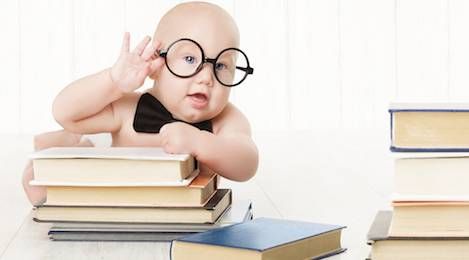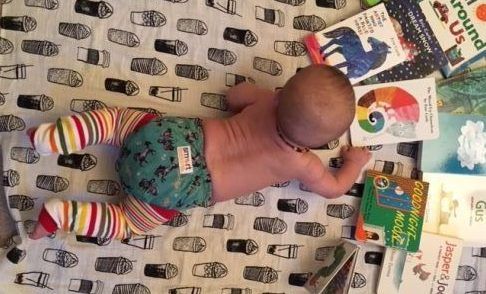
How Reading With My Son Helps Me Communicate With Him
We all know the benefits of reading to babies and children—bonding, better vocabulary, introducing emotion, and more—and coming from a family of educators, I took it seriously. As an avid reader, I was excited to start reading to my baby, and by the time my son was born, I had stacks of board and picture books waiting for him. Of course, when a baby is actually born, it catapults you into a sleep-deprived fever dream that looks nothing like what you expected, and most of those idealized daydreams never actually come to fruition (sorry for that spoiler alert, btw). But what I did manage to hold onto was reading to my baby.

My son with his books.
Once we got into a semi-routine, I would read to my son every night; usually Goodnight Moon. Sometimes I alternated with The Rainbow Fish or a Baby Lit book, but Goodnight Moon seemed appropriate. Before I knew it, I’d memorized it. As he grew older, it was clear that he recognized the book, the words, and the rhythm. If he was upset during a diaper change, I’d start to say the words, “In the great green room…” and he’d immediately quiet down.
My son was always a high-needs baby—yes, it’s a thing; it’s true that babies are demanding, but high-needs babies are even more so—and as a single parent, I was exhausted. But I had noticed little things about his development that seemed a bit delayed. In the moment, it was easy to say that each child was different and matures in their own time. But by the time he went for his 9-month visit, it was becoming very clear to me that there might be cause for concern. He didn’t babble at all, and wouldn’t always turn if I said his name or tried to get his attention (yes, we saw an audiologist and his ears were fine). I will always remember his (former) pediatrician sitting across from me, looking at me and with a hint of disdain, asking me if I ever read to my baby. I replied that we read every night, and nearly every day during the day; that my son loved books.
Long story short, yes, my son had—and has—communication delays. At the age of 2, he still isn’t talking, per se. But he now can read and recognize his ABCs and make each of their sounds. Since infancy, books have been one of the things we share. He’s gone through at least three copies of Goodnight Moon, because he loves it so much. The binding breaks, he inadvertently tears off the cover, and there was the time he got ahold of a pen of mine and did some editing and annotating of the story. We have stacks of board books in the living room: Baby Lit books, Quantum Physics for Babies, ABCs of Biology, and more. Throughout the day, my son will often pull a book or two out and read it, or bring me over a book while I’m working for me to read to him. While he can’t always say things with words, my son communicates plenty with actions—holding my hand while we read, signing and saying “mo” for me to read another book, the smile on his face as he sorts through a pile of books at the bookstore, or grabbing the book from me when I turn the last page, so he can reread it on his own. Reading with him has been something we share every day, and it makes me so happy to see him with a stack of his own books, captivated by the pictures, and now, sounding out each letter, looking up at me to make sure I’m watching him.
And yes, we still read Goodnight Moon every night.











